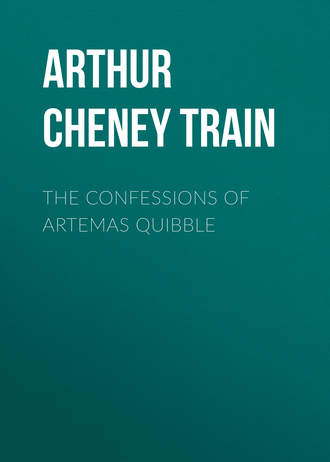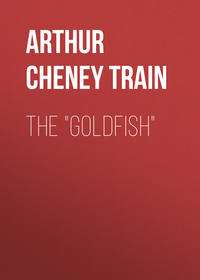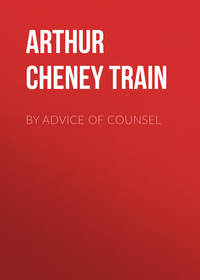 полная версия
полная версияThe Confessions of Artemas Quibble
He sighed deeply and slowly drew down his left eyelid.
"Thank you, Mr. Gottlieb," said I, suppressing an inclination to smile. "I'll take your advice. Perhaps you'll let me talk to you again later on."
"Come as often as you like," he replied. "And look you, young- feller-me-lad, I'll give you half of all the profits I make out of any business you bring me. You don't have to be a lawyer to get clients. Hustle around among your friends and drum up some trade and you'll do almost as well as if you could try cases yourself. For every dollar I earn you get another. Is it a go?"
"Surely!" I cried. "And if I'm not very much mistaken I'll not be long about it, for I have an idea or two in my head already."
The next day I again presented myself at the office of Haight & Foster, where I had already applied for a position to the chief clerk. This time I asked for the head of the firm himself, and I was amused to see that whereas before I had been almost kicked out of the office, I was now treated with the respect due to a possible client. After a wait of some twenty minutes I was ushered into a large sunny office lined with books and overlooking the lower East River. Mr. Haight was a wrinkled old man with a bald scalp covered with numerous brown patches about the size of ten-cent pieces. A fringe of white hair hung about his ears, over one of which was stuck a goose-quill pen. He looked up from his desk as I entered and eyed me sharply.
"Well, Mr. Quibble," he began gruffly, as if he were about to add, "out with what you have to say, young man, and be gone as soon as possible!"
"Mr. Haight," said I with great defence, "I have called on you at the suggestion of my guardian and trustee, Mr. Tuckerman Toddleham, of Barristers' Hall, Boston, to inquire whether I may not be allowed the great privilege of a desk in your office. I am a Harvard man, born in Salem, and of an old Massachusetts family. Ever since I made up my mind as a boy to enter the law it has been my ambition to study in your office; and, I may add, it is also the earnest hope of my guardian, Mr. Toddleham."
"Do you refer to the Mr. Toddleham of 'Toddleham on Perpetuities'?" he asked with some interest.
"The same," I answered, for although I had never heard of the work in question, it seemed just the sort for old Toddleham's production.
"I am glad to know you, Mr. Quibble," he exclaimed, extending his hand. "I have often wished that I could meet your guardian and ask the great Mr. Toddleham face to face what he really thinks of the Rule in Shelley's Case—what do you think of it? What was the Rule in Shelley's Case, may I ask?"
Now, I had never heard of the rule in question, so for want of a better answer I replied:
"The law is no respecter of person. I suppose the rule was the same in his case as in any other."
Mr. Haight looked at me strangely for a moment and suddenly began to chuckle. Then he eyed me again and chuckled still more. Finally he laid aside all modestly and hugged himself with delight.
"I see that you are a man of esprit!" he remarked between spasms. "I shall be glad to take you into my office. You may go and introduce yourself to Mr. Spruggins, the chief clerk."
Thus it was that I secured my first slender foothold at the bar of New York, and it was not for several years that I discovered that the Toddleham who had written the book on Perpetuities was an entirely different person, belonging to another branch of the family.
Of course I received no compensation for my services at Haight & Foster's, but that was the customary rule with all students. As a result we were not strictly tied down in our attendance at the office. I really believe it would have been cheaper for the firm to have paid a small salary to their clerks, for it would then have been in a position to demand much more of them in return. As it was I found myself able to come and go about as I chose, and being obliged to support myself in some way my attendance at the office was quite irregular. But I was started at last and belonged somewhere. No longer was it necessary for me to wander about the streets looking for a place to hang my hat, and I already had schemes in mind whereby I was soon to become rich.
My associates in the office were all scholarly, respectable young men, most of them law-school graduates and scions of well-known families, and I was not insensible to the advantage to me that my connection with them might be later on. It was essential that I should impress them and the firm with my seriousness of purpose, and so I made it a point, unpleasant as I found it, to be on hand at the office every morning promptly at eight-thirty o'clock, ready to arrange papers or serve them, and to be of any assistance, no matter how menial, to Mr. Spruggins, whose sense of dignity I took pains to flatter in every way possible. In the afternoon, however, I slipped away on the pretext of having to go uptown to study, but in point of fact in order to earn enough money to pay for my board and lodging.
I had been cogitating several ideas since I had visited Gottlieb, and the one that appealed to me the most was that of procuring of business for other lawyers upon a percentage basis. I reasoned that there must be several hundred thousand people in the city who had no acquaintance with lawyers and would be as ready to consult one as another. Reputable lawyers did not advertise, to be sure, but I was not yet a lawyer, and hence many courses were open to me at this stage in my career that would be closed later on. I had considerable confidence in my own persuasive ability and felt that it was only a question of time before I could drum up a substantial amount of business. Accordingly I had a few cards neatly printed on glossed board reading:
MR. ARTEMAS QUIBBLE
BROADWAY
OF
HAIGHT & FOSTER Contracts
ATTORNEYS-AT-LAW Mortgages
10 WALL STREET Tax Matters
NEW YORK CITY General Advice
The Haight & Foster end of the card was done in very heavy type, while my own name was comparatively inconspicuous. Further to assist my plans I rented a tiny office not far from Madison Square for the sum of two dollars per week and furnished it with a table, two chairs, and an inkpot. The door bore the inscription:
OFFICE OF ARTEMAS QUIBBLE, ESQ. COUNSELLORThe reader will observe that not being authorized as yet to practice as an attorney I was scrupulous not to hold myself out as one. "Counsellor" might mean anything. Certainly I had the right to give counsel to such as desired it. Here I might be found at and after half-past one of every day, having already done five hours' work at the office of Haight & Foster. I still had enough funds to carry me for some three weeks and so felt no immediate anxiety as to the future, but I realized that I must lose no time in getting out my tentacles if I were to drag in any business. Accordingly I made myself acquainted with the managers and clerks of the neighboring hotels, giving them the impression, so far as I could, that Haight & Foster had opened an uptown office and that I was in charge of it. I made friends also with the proprietors and barkeepers of the adjacent saloons, of which there were not a few, and left plenty of my cards with them for distribution to such of their customers as might need legal assistance, in each case promising that any business which they secured would be liberally rewarded. In short, I made myself generally known in the locality and planted the seed of cupidity in the hearts of several hundreds of impecunious persons. It was very necessary for me to net ten dollars per week to live, and under the circumstances it seemed reasonable to believe that I could do so.
Almost at the outset I had a piece of luck, for a guest at a Fifth Avenue hotel was suddenly stricken with a severe illness and desired to make a will. It was but a few days after I had called upon the manager, and, having me fresh in his mind, he sent for me. The sick man proved to be a wealthy Californian who was too far gone to care who drew his will so long as it was drawn at all, and I jotted down his bequests and desires by his bedside. I had originally intended to go at once to Mr. Haight and turn the matter over to him, but my client seemed so ill that it appeared hardly necessary. I persuaded myself with the argument that the affair required a more immediate attention than the office could give, and accordingly decided to draw the will myself and incidentally to earn the whole fee. The proceeding seemed honest enough, since, although I had been introduced as representing Haight & Foster, the sick man had never heard of them before and obviously did not care one way or the other.
I had never drawn a will or any other legal paper, but I lost no time in slipping around to Gottlieb's office and borrowing a work on surrogates' practice, including forms, with which under my arm I hurried back to my office. Here after a good many unsuccessful attempts I produced a document sufficiently technical to satisfy almost any layman and probably calculated to defeat every wish of the testator. Of this, however, I was quite ignorant, and do myself the justice to say that, had not that been the case, I would not have attempted what I now know to have been an impossible task for one of my lack of legal education. I carefully engrossed the will in long hand on fresh foolscap, ornamented it with seals and ribbons and, returning to the hotel, superintended its execution. My client asked my how much was my fee and I modestly replied—as I never expected to see him again this side of the grave—that my charge would be one hundred and fifty dollars. He nodded, and indicating his pocketbook, told me to help myself, which I did, regretting not having asked for more. That night he died, and my impromptu will was forwarded to California and became the subject of a litigation lasting over eleven years and costing several hundred thousand dollars.
It thus happened that my eagerness to begin to build up my material fortunes, coupled with the necessity of having a technical connection with a regular firm of lawyers, resulted in my leading a sort of double legal existence. In the morning I was a mere drudge or office devil, in the afternoon I was Counsellor Quibble, head of his own office and my own master. Having now a capital of one hundred and fifty dollars I was in a position to put one of my schemes into practice, and accordingly I drew up with great care the following instrument, copies of which I had struck off by a theatrical job printer near by:
====================================================================== THIS AGREEMENT made this . . . . day of . . . . . . . . , 1878, between . . . . . . . . . . . . . . . . . . , of the City and County of New York, party of the first part, and Artemas Quibble, Esquire, of the same, party of the second part, WITNESSETH:
That the said party of the first part in consideration of one dollar to him in hand paid upon the first day of each month by the party of the second part, hereby covenants and agrees to employ at a reduced rate the said party of the second part to look after all the legal matters that my arise in his business and to recommend said party of the second part to his friends and acquaintances as a suitable person to perform the like services for them; in the latter event the said party of the first part to receive as a further consideration a commission of one-third of the fees of the party of the second part procured therefrom.
IN WITNESS WHEREOF we have hereunto set our hands and seals the day and year above named.
……………………………..(*) ……………………………..(*) ======================================================================
Armed with these insinuating documents I procured a fresh roll of one hundred one-dollar bills and set forth to interview all whose acquaintance I had made in the course of my brief residence in the city. My argument ran thus: Almost anybody would be willing to receive a dollar every month in return for a service that would cost him nothing. With an outlay of one hundred dollars I could have a hundred persons virtually in my employ trying to get me business. After the first month I could discontinue with those who seemed likely to prove unremunerative. Almost any case would return in fees as much as my original disbursement. On the whole it seemed a pretty safe investment and the formal-looking contract would tend to increase the sense of obligation upon the contracting party of the first part. Nor did my forecast of the probabilities prove at all wide of the mark. Practically every one to whom I put the proposition readily accepted my dollar and signed the agreement, and at the end of a week my one hundred dollars had been distributed among all the cab drivers, conductors, waiters, elevator men, clerks, bartenders, actors, hall boys, and storekeepers that I knew or with whom I could scrape an acquaintance. None of them expected to have any business of their own and all welcomed with delight the idea of profiting by the misfortunes of their friends.
I had often lost or won at a single sitting at cards a much larger sum than the one I was now risking in what seemed an excellent business proposition, so that the money involved caused me no uneasiness. Besides, I had fifty dollars left in my pocket. Meantime I spent my evening in my office reading Blackstone and such text-books as I cared to borrow from the well-equipped library of my employers.
Business came, however, with unexpected promptitude. At the end of the first week I had received calls from two actors who desired to sue their managers for damages for breach of contract, five waiters who wished to bring actions for wages due, and actress who wanted a separation from her husband, a bartender who was charged with assault for knocking the teeth of an unruly customer down his throat, and a boy whose leg had been caught under an elevator and crushed. Each of these I made sign an agreement that I should receive half of any sum recovered in consideration of seeing that they received proper legal advice and service, and each of them I sent over to Counsellor Gottlieb, with whom I executed a mutual contract to divide evenly the fees received.
The reader will notice that I did not technically hold myself out as a lawyer in these contracts, and merely agreed to furnish counsel. Thus I flattered myself I was keeping on the lee side of the law. Gottlieb settled the case of the boy for twelve hundred dollars, and we divided six hundred between us, and the other cases that came in the first month netted us three hundred dollars apiece more. The future began to look bright enough, as I had to distribute as commissions only two hundred dollars, which left me a gross profit of four hundred dollars. With this I secured fifty new contracts, and after paying the second installments upon all the first I pocketed as a net result two hundred and fifty dollars cash. I now had a growing business at my back, finding it necessary to employ an office assistant, and accordingly selected for that purpose an old actor who was no longer able to walk the boards, but who still retained the ability to speak his part. For a weekly wage of ten dollars this elderly gentleman agreed to sit in my office and hold forth upon my ability, shrewdness, and learning to all such as called in my absence. In the afternoons I assumed charge myself and sent him forth armed with contracts to secure new allies.
My business soon increased to such an extent that it bid fair to take up all my time, and the bookkeeping end of it, with its complicated division of receipts, proved not a little difficult. The amazement of my friend Gottlieb knew no bounds, but as it was a profitable arrangement for him he asked no questions and remained in ignorance as to the source of my stream of clients, until one of his friends, to whom my assistant had made application, showed him one of the contracts. That night he sent for me to come to his office, and after offering me a very large and exceedingly good Havana cigar delivered himself as follows:
"Harkee, Quib, you are more of a fellow than I took you for. You have more cleverness than any man of your years in my acquaintance at the bar. This scheme of yours, now, it's a veritable gold mine. Not but that anybody could make use of it. It can't be patented, you know. But it's excellently devised; no one will deny that. What do you say to a partnership, eh? On the same terms?"
Now, I had more than once thought of the same thing myself, but the idea of associating myself in business with an out-and-out criminal attorney had to my mind serious drawbacks. We discussed the matter at length, however, and Gottlieb pointed out very wisely that I was running a great risk in distributing broadcast cards upon which appeared the unauthorized name of Haight & Foster, as well as in conducting an office under my own name, when in fact I was but an attorney's clerk downtown. My connection and association with such a reputable firm was an asset not to be jeopardized lightly, and he advised my withdrawing so far as I could all my cards from circulation and conducting my business sub rosa. In the end we came to an understanding which we reduced to writing. I was to become a silent partner in Gottlieb's business and my office was to become a branch of his, my own name being entirely in abeyance. On the whole, this arrangement pleased me very well, as under it I ran practically no risk of having my activities discovered by my employers.
It is somewhat difficult to know just in what order to present these memoirs to the reader, for from this time on my life became a very varied one. Had I the time I should like nothing better than to paint for my own satisfaction an old-fashioned law office as it was conducted in the 'seventies—its insistent note of established respectability, the suppressed voices of its young men, their obvious politeness to each other and defence to clients, their horror at anything vulgar, the quiet, the irritating quiet, Mr. Wigger's red wig—he was the engrossing clerk—the lifelessness of the atmosphere of the place, as if nothing real ever happened there, and as if the cases we prepared and tried were of interest only on account of the legal points involved. When I was there, filing papers in their dusty packages, I used to feel as though I was fumbling among the dust of clients long since dead and gone. The place stifled and depressed me. I longed for red blood and real life. There I was, acting as a clerk on nothing a year, when uptown I was in the centre of the whirlpool of existence. It was with ill-concealed gratification that I used daily at one o'clock to enter the library, bow to whatever member of the firm happened to be there, remove a book from the shelves and slip out of the door. A horse-car dropped me in half an hour at a hotel near my office. After I had snatched a sandwich and a cup of coffee in the café I would dash up to my office—the door of which now bore the lettering:
ABRAHAM GOTTLIEB
ATTORNEY & COUNSELLOR-AT-LAW
BRANCH OFFICE
SIDDONS KELLY, MANAGER
Siddons Kelly was the superannuated actor of whom I have already spoken, and when he was not, so to speak, in drink he was an invaluable person. He had followed the stage all his life, but he was of the sort that tear passion to tatters and he had never risen above third-rate parts. In every respect save declamation he had all the elegances and charm of manner that the stage can give, and he would receive and bow out a scrubwoman who had fallen down a flight of back stairs and wanted to make the landlord pay for her broken head with a grace truly Chesterfieldian. This was all very fine until he had taken a drop too much, when his vocabulary would swell to such dimensions that the confused and embarrassed client would flee in self-protection unless fortunate enough to be rescued by Gottlieb or myself. Poor Kelly! He was a fine old type. And many a client then and later was attracted to my office by his refined and intellectual old face with its locks of silky gray. An old bachelor, he died alone one night in his little boarding- house with a peaceful smile on his wrinkled face. He lies in Greenwood Cemetery. Over him is a simple stone—for which I paid —bearing, as he had requested, only the words:
SIDDONS KELLEY AN ACTORAs may well be supposed, my professional career uptown was vastly more entertaining than my experiences at Haight & Foster's. My afternoons were filled with a constant procession of clients of all ages, sexes, colors, and conditions. As the business grew and greater numbers of persons signed our contracts and received their honorarium of a dollar a month, a constantly increasing percentage of criminal or semi-criminal cases came to the office. Of course there was no better criminal lawyer than Gottlieb in the city, and before long the criminals outnumbered our civil clients. At the same time I noticed a tendency on the part of the civil business to fall off, the reason for this probably being that my partner was known only as a criminal attorney. Now, I began to dislike the idea of paying a dollar a month to induce people to refer business to us, and indeed I found that the disbursement of five or six hundred dollars every four weeks for this purpose was no trifling matter. Accordingly I decided to try letting them go for a month or so, but business fell off to such an alarming extent that I almost immediately resumed the contract system, merely reducing its proportions.
In addition to our "dollar-a-monthers," as we called them, Gottlieb employed half a dozen professional "runners," whose sole occupation it was to hunt down unfortunate persons injured accidentally and secure their cases. These employees made a business of joining as many social clubs, labor and other organizations as possible and swinging the business in Gottlieb's direction. At one time the competition for accident cases became so fierce that if a man were run over on Broadway the rival runners would almost tear him limb from limb in their eagerness to get his case; and they would follow a dying man to the hospital and force their way on one pretext or another to his bedside. There used to be a story, which went the rounds of the clubs and barrooms, of a very swell old buck who owed an enormous amount of money and who happened to be knocked down and rendered insensible by a butcher's wagon. He was taken to the hospital and did not regain consciousness for several hours. When at last he opened his eyes he saw several dozen cards plastered upon the ceiling directly over his head, reading:
GO TO
LEVY & FINKLESTEIN
ATTORNEYS-AT-LAW
WE GET YOU MONEY!
TRY
EINSTEIN & GOLDBERG
IN THE BUSINESS 30 YEARS
SOLOMONS & MEYER
ATTORNEYS
CAN GET YOU
$5000 FOR A LEG
$10,000 FOR A LIVER
MOSES BLOOM THE HONEST LAWYERSAMUEL SHARP COUNSELLOR-AT-LAW"Ah!" he murmured, rubbing his eyes and turning to the nurse; "I thought I was in some strange place, but I see that all my friends have been to call already!"
Our criminal business, however, was so extensive that it took practically all of Gottlieb's time, and he found it necessary to hire a couple of clerks to attend to the civil cases that came to us. My partner was obliged to spend the whole of almost every day in attendance at the criminal courts. Frequently he remarked jestingly that under the circumstances, as he had to give all his time to it anyway, he could as easily attend to all the criminal business of the city as to the small part of it that came to him.
"Well," I said to him one day, "why don't you?"
"Why don't I what?" he retorted.
"Get all the criminal business there is," I answered.
"Quib," he exclaimed excitedly, "have you got another of your ideas?"
"I think so," I returned. "How does this strike you? Why not issue a policy, like life or accident insurance, in which for a moderate sum you agree to defend free of charge any man accused of crime? You know that every criminal is always trying to save up money against the time when he shall be caught and have to hire a lawyer. Now, it is true that these fellows pay very well, but there are not many that can pay a large fee. If you could get enough crooks to take out a policy at ten dollars per year you might make a good thing of it."
"But how would we get our scheme going?" inquired my partner, with a gleam in his eye. "It certainly is a gold mine, if it will work."
"Leave the thing to me," I admonished him.





